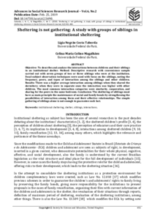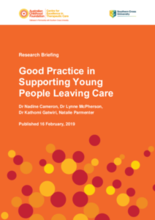Displaying 471 - 480 of 1459
The present study aimed to measure lifetime prevalence and frequency rates of child physical and emotional abuse, neglect, domestic violence, and several types of sexual and peer victimization among adolescents in residential care.
This country care review includes the care-related Concluding Observations adopted by the Committee on the Rights of the Child. The Committee's recommendations on the issues relevant to children's care are highlighted, as well as other care-related concluding observations, ratification dates, and links to the Universal Periodic Review and Hague Intercountry Adoption Country Profile.
This country care review includes the care-related Concluding Observations adopted by the Committee on the Rights of the Child.
This study investigates staff perspectives on a new form of intensive oversight developed in New York State to prevent maltreatment of youth in care facilities.
This country care review includes the care-related Concluding Observations adopted by the Committee on the Rights of the Child.
To ensure protection of children from institutional abuse, there is an urgent need to review the existing laws in terms of their efficacy to protect children and feasibility in implementation. The present study suggests possible solutions, by trying to understand standardized and effective models of care systems and mechanisms.
The purpose of this paper is to describe and analyze the interactions between children and their siblings in an institutional shelter in Brazil.
This book explores how humanitarian interventions for children in difficult circumstances engage in affective commodification of disadvantaged childhoods.
The aim of this study is to explore whether girls who are in residential care have fewer emotional skills than their peers, and if so, whether these girls have similar socio-emotional skills to girls who also experience disadvantaged environments but live with their families.
This research summary provides an overview of what young people leaving residential care in Australia need and how those working in residential care can best help young people prepare for independence.





